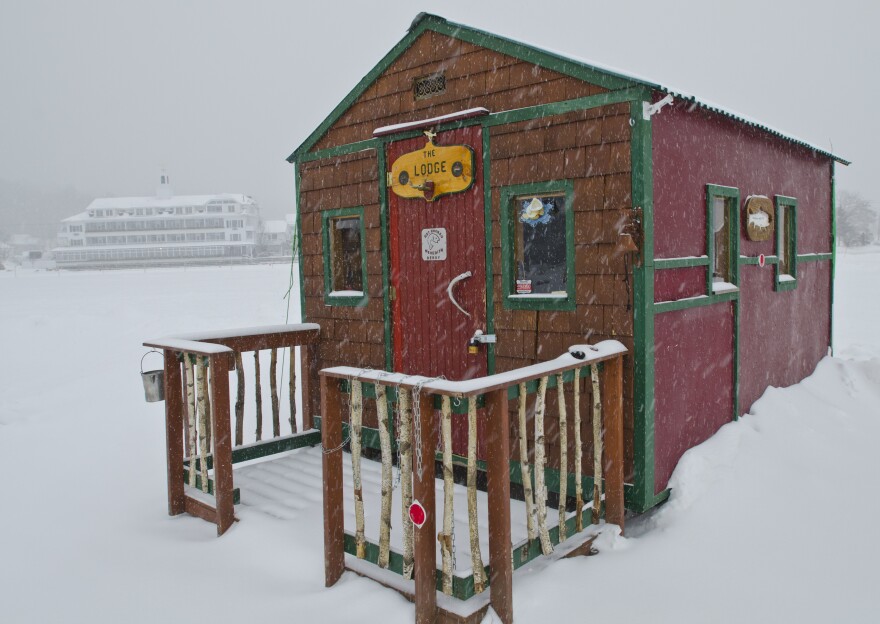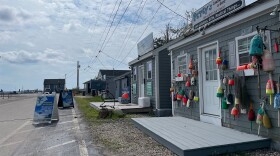Every sportsman knows that the best way to catch prey is to use the right bait.
So when the Meredith Rotary Club wanted to raise funds with an ice fishing charity competition years ago, the members chose the best bait they could imagine: money.
“We really believed that was the key to having so much interest in our event,” recalled John Sherman, a current Rotarian who helped start the Great Meredith Rotary Fishing Derby back in 1979. “We offered what was, back then, a lot of prize money.”
The idea worked beyond expectations. This weekend, thousands of fisherfolk from around the world will descend on Meredith Bay in Lake Winnipesaukee to participate in the 36th annual Great Meredith Rotary Fishing Derby. Over the years, it’s grown into the largest ice-fishing derby in New Hampshire and one of the most prominent in New England.

The scale of the derby shouldn’t be a surprise. Ice fishing has been part of life in the Lakes Region for years. Locals can recall the little “villages” of fishermen bob houses that sprang up on frozen parts of Winnipesaukee back in the early 20th century.
Each one had its own distinct character, depending on the people who participated.
One of the most remarkable, “Fisherville” in Wolfeboro Bay, had a fairly elaborate social structure including an elected mayor and bob house structures that served as the town hall, the police station, the courthouse and other landmarks.
Some bob house villages featured entertainments like hockey and baseball games, or iceboat and “mud buggies” races. (The buggies were basically stripped down automobiles.)
Bob house “villages” still pop up around the state during Derby weekend, but things are different now.
The Derby fishermen compete for cash prizes on a daily basis: the five largest fish in seven categories caught each day – cusk, pickerel, yellow perch, white perch, black crappie, lake trout and rainbow trout – are hung on the outdoor competition board, and the anglers get cash prizes between $250 and $50. The single heaviest fish in each category wins a $500 prize at the end of the Derby.
Finally, the top three prizes – of $15,000, $5,000 and $3,000 – are randomly drawn from the names of the 14 anglers who’ve caught the largest fish in each of the seven categories each day. While most Derby fishing goes on in the Lakes Region, fish caught anywhere in New Hampshire are eligible.
There were no cash prizes in the old days but the bob house village residents – mostly men –regularly gathered in the ice-cold winter weather to spend hours together on the frozen water, just enjoying friendly competitions and being together.

Local outdoorsman Bill Allen said ice fishing has always been more about camaraderie than the sport.
“You don’t actually fish,” he said, talking about his Derby group which has been coming to the event for more than 25 years.
“You drill a hole and set up your tip-up.”
A tip-up is a wooden or plastic device that allows an angler to drop a line in the cold water with bait on a hook at the end; when a fish grabs the bait, a small flag ‘tips up’, alerting the fisherman.

“When you go ice fishing, it’s what you do after that, after you drop your line in – that’s what it’s all about.”
Allen’s group includes several avid outdoorsmen who have been known to spread out some fire-cooked fish and deer meat on the ice before consuming a dinner similar to what’s served at a five-star restaurant, he said.
A friend of Allen's regularly sets up a 13-foot wide, 100-feet long, regulation-sized bocce court on an area of 19 Mile Bay. “They sit there all day and play bocce,” he said.
Allen also knows of a pilot who drops bottles of beer from his cockpit to thirsty anglers below, and he’s seen years when the snow was piled so high that “street signs” start popping up on the lake.
The bay area is also a showplace for those who love their bob houses as much as they love to fish.
Rotary Club President Craig Wiggin said he’s seen some peculiar sights over the years, particularly in the event’s most populous bob house village near the Derby Headquarters building in Meredith Bay.
“It’s weird seeing a helicopter come in or a plane on skis,” Wiggins said. One year, he said, a real estate company had a hot air balloon on the bay.

Bob Myshrall owns “The Lodge,” an old-fashioned looking structure with a shingled front and a small deck around its front door. Myshrall said he and his building partner Pete Muse are always tinkering with their little home-away-from-home.
“This year I remodeled the sink and the stove,” he said. “There’s a fireplace in there and we just added new countertops.”
One year they had a hot tub out front, which drew scores of interested people – or, “squatters,” as Myshall jokingly calls the crowds of regular visitors. “They come for the free heat, and to mooch our food and beer.”
Myshrall said he’s probably invested about $4,500 in “The Lodge” over the last five years and he’s looking forward to spending some time in it this weekend.
“Neither of us has ever won anything at the Derby in the 28, 30 years we’ve been fishing it,” he said, referring to himself and Muse.
“No money, no prizes – nothing. But we did win Best Bob House in the Lakes Region one year!”

Most anglers never go home with prize money in their pockets but they can leave with a good feeling that their $30 Derby ticket fee has helped the Meredith Rotary live up to its goals of improving the Lakes Region community. Over the years, the Derby has allowed the Rotarians to donate more than $1 million to causes in the area, most recently educational scholarships for both traditional students and unconventional adult learners.
This is, after all, what the club was fishing for when it started the Derby years ago.
Ray Carbone is a longtime New Hampshire writer who has just completed a book entitled “Legendary Locals of New Hampshire’s Lakes Region,” which will be released in the spring. He can be reached at raycarbone@yahoo.com








